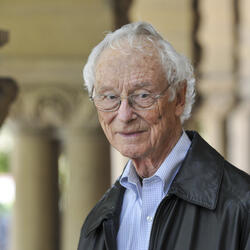Michael M. May

Michael M. May, PhD
- Professor, Management Science and Engineering, Emeritus
- FSI Senior Fellow
- CISAC Faculty Member
- Not in Residence
Biography
Michael May is Professor Emeritus (Research) in the Stanford University School of Engineering and a senior fellow with the Freeman Spogli Institute for International Studies at Stanford University. He is the former co-director of Stanford University's Center for International Security and Cooperation, having served seven years in that capacity through January 2000.
May is a director emeritus of the Lawrence Livermore National Laboratory, where he worked from 1952 to 1988, with some brief periods away from the Laboratory. While there, he held a variety of research and development positions, serving as director of the Laboratory from 1965 to 1971.
May was a technical adviser to the Threshold Test Ban Treaty negotiating team; a member of the U.S. delegation to the Strategic Arms Limitation Talks; and at various times has been a member of the Defense Science Board, the General Advisory Committee to the AEC, the Secretary of Energy Advisory Board, the RAND Corporation Board of Trustees, and the Committee on International Security and Arms Control of the National Academy of Sciences. He is a member of the International Institute on Strategic Studies, and a Fellow of the American Physical Society and the American Association for the Advancement of Science.
May received the Distinguished Public Service and Distinguished Civilian Service Medals from the Department of Defense, and the Ernest Orlando Lawrence Award from the Atomic Energy Commission, as well as other awards.
His current research interests are nuclear weapons policy in the US and in other countries; nuclear terrorism; nuclear and other forms of energy and their impact on the environment, health and safety and security; the use of statistics and mathematical models in the public sphere.
May is continuing work on creating a secure future for civilian nuclear applications. In October 2007, May hosted an international workshop on how the nuclear weapon states can help rebuild the consensus underlying the Nuclear Non-Proliferation Treaty (NPT). Proceedings and a summary report are available online or by email request. May also chaired a technical working group on nuclear forensics. The final report is available online.
In April 2007, May in cooperation with former Secretary of Defense William J. Perry and Professor Ashton Carter of Harvard hosted a workshop on what would have to be done to be ready for a terrorist nuclear detonation. The report is available online at the Preventive Defense Project. A summary, titled, "The Day After: Action Following a Nuclear Blast in a U.S. City," was published fall 2007 in Washington Quarterly and is available online.
Recent work also includes a study of nuclear postures in several countries (2007 - 2009); an article on nuclear disarmament and one on tactical nuclear weapons; and a report with Kate Marvel for the American Academy of Arts and Sciences on possible game changers in the nuclear energy industry.


